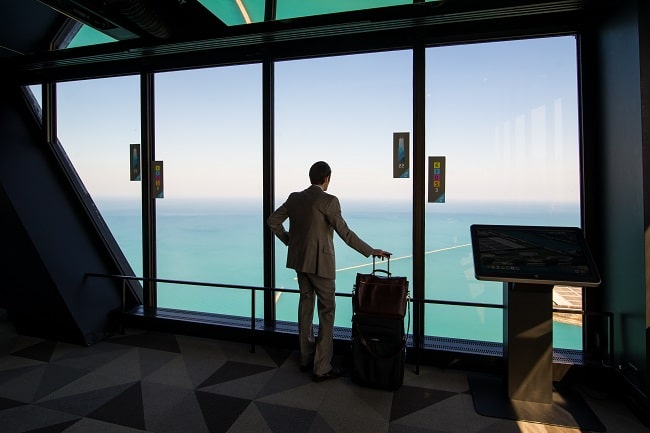
When it comes to business travel safety planning, there are certainly a lot of things you must consider. From vetting the hotels you book, the countries you visit, and the modes of transportation you take on your journey, you need to be fully prepared.
While business travel is a rewarding experience, there can also be some risks. Whether the trip is across the country or town, there are safety tips to consider no matter how far you are traveling for your job.
An unsafe work environment can prove to be costly both emotionally and financially and injure the productivity of the whole organization. Here are some tips that can help you ensure a positive workplace culture when your staff members travel.
Plan Ahead for Your Business Trip
The first step in preparing for a business trip is planning as much as possible. Ensure you know where the airport, train station, or bus terminal is located, when the departure is scheduled, and when to arrive at the airport or other transportation facility. Plan to arrive at least one hour before your flight or train departs so that you have time to check-in, go through security and make any last-minute purchases before boarding.
Planning can prevent many problems such as missing a connecting flight or staying in an unfamiliar city overnight because of delayed flights or lost luggage. It also helps to know what paperwork is required for your trip and whether you need vaccinations or other medical care before leaving home. While some business trips can be short and spontaneous, you should always have a clear idea of where you’re going and when you’ll be back.
Check out the Airline’s Safety Record
Research is key when it comes to booking international travel flights. One of the first things you should check out is the airline’s safety record. You can find this information on sites that have lists of airlines ranked by safety standards, customer service, and overall experience based on customer feedback. If there are a lot of complaints about delays or cancellations, you might want to consider flying with another airline.
If there are several accidents or incidents, consider flying with another airline or rethinking your travel plans altogether. You should also check out the airline’s refund policy. If they don’t offer refunds, book with a different carrier instead.
Make Sure You Have Travel Insurance
If you’re traveling for business purposes in a foreign country, chances are that you’ll be away from home for an extended period, possibly several days or weeks. This means there’s a chance something could go wrong during your trip or even after. You never know when an accident or illness will strike, and if you’re traveling for work, your company may not pay for medical expenses. A good travel insurance policy covers lost baggage, trip cancellations, and emergency medical care.
If you’re traveling out of town for work, your employer may cover lost wages and medical expenses if you’re injured or ill. However, it’s important to understand that this type of coverage is limited and not comprehensive. That’s why it’s important to have your personal travel insurance policy before you leave home to be protected in case of an emergency or accident.
Use Secure Wifi Connection

Having secure Wi-Fi connections is one of the most important security measures. It’s not enough to connect to an open network. You also need to make sure that it’s encrypted and protected. This can be done by checking the network’s security protocol you are connecting to. If the connection is unsecured or protected with a weak password, don’t use it. The last thing you want is your personal information stolen while traveling for work.
Hackers can easily access unsecured networks. So when connecting to public Wi-Fi networks, use a virtual private network (VPN) service to protect your data and identity. VPNs encrypt all of your activity so that no one else can see what you’re doing online. This also helps prevent hackers from gaining access to your device or stealing your personal information if they manage to break through the Wi-Fi network’s security.
If you don’t have access to an encrypted corporate VPN, then use a secure public Wi-Fi connection, such as those found at airports or coffee shops. When using these networks, avoid accessing sensitive information. Don’t do any banking or check email while in an airport terminal.
Conduct a Thorough Pre-Travel Risk Assessment
You should complete a thorough pre-travel risk assessment before any trip, regardless of whether or not it’s a business trip. This will help you identify potential risks and prepare for them. Conducting this assessment will also allow you to determine what type of insurance coverage and safety equipment you need before leaving for your trip.
For example, if you’re going to be in an area with a high crime rate, perhaps it would be wise to purchase some pepper spray or take self-defense classes before leaving home. Or look for hotels near the police station or safer/more secure locations in the city.
A risk assessment can include checking weather conditions in the area, contacting local authorities, and checking with your employer about any special security protocols that may need to be followed during your trip. This will help ensure that you are prepared for whatever situation may arise during your travels when you arrive at your destination.
Have the Right Travel Documents

You should always carry their essential documents such as copies of their passports and visa. Make sure you have a passport that works for all countries you plan to visit and, if possible, multiple copies. Know what kind of visa you need for each country and ensure it’s in order before leaving the country. If you’re traveling internationally on business, make sure someone from your company has all the necessary information handy if something happens while you’re away.
Your passport should be valid for at least six months after your return date from your business trip. If you happen to lose your passport, make sure you have photocopies of all your documents on hand so that you can replace them quickly.
Keep Track of Your Credit Cards and Debit Cards
If you’re traveling on business, it’s good to carry only one credit card and one debit card while on the road. If your wallet is lost or stolen, you won’t lose all your payment methods at once. If you need to travel with more than one card, keep them in separate places, i.e., one can be in your purse/bag and one in your pocket.
It’s easy to lose track of these items when traveling for work because they can get lost in the shuffle or stolen by someone from your hotel room. If you suspect that someone has stolen your card information, contact your bank immediately so they can cancel it before any unauthorized transactions occur.
You should also take photos of all of your cards, the front and back so that if they are lost or stolen, you’ll have an easy way to report them as missing or stolen and get replacements quickly. But, make sure you secure your phone with a passcode or biometric. Otherwise, if your phone gets stolen, the thief will have all of your card information.
To protect yourself, keep a close eye on your credit card statements whenever you travel for business. If there’s an unauthorized charge, you’ll know about it right away and can cancel your card before more money is stolen from your account.
Be Prepared for the Weather and Possible Natural Disasters
You don’t want to get caught in a storm or other natural disaster while traveling. Being prepared can help keep you safe should anything happen.
For instance, if you’re going to be traveling during hurricane season, make sure your hotel is prepared for storms and evacuations. You’ll also want to check if there are any natural disasters in your area that could affect your trips such as earthquakes or wildfires.
Make sure you have travel plans for every type of weather event that could occur. If there is a possibility of severe weather, contact your manager or the company’s travel department to see if they can help you find alternate flights or if they can reschedule your trip for another day. Also, make sure you know what constitutes severe weather in your area to stay away from hazardous situations.
Have an Emergency Plan

If there’s an emergency, having a plan will help you stay safe and get back to your family or friends as quickly as possible. Ensure everyone knows where to find the information about your trip and who to contact if something goes wrong. You should also let them know how long they should wait before filing an official missing person report with the police or other authorities.
Everyone involved in the business trip needs to know what to do in an emergency. It’s important to have emergency services ready before you leave so that everyone knows what steps to take if something happens.
Have one central place where everyone can go if there’s an emergency at home or on the road, like an office building or hotel room. This could be as simple as printing out directions to a local police station or fire department and posting them prominently in each building or hotel room where people are staying during their trip.
Also, make note of the emergency telephone number in the country you are visiting. If you’re from the U.S., you know 911 by heart. But, in many countries, the emergency line differs.
Take Proper Health Precautions
Ensure you’re up to date on all vaccinations before you leave home and get any medications you might need from your doctor or local pharmacy. Pack plenty of insect repellent especially if you’re going somewhere known for being buggy.
Business travels need a high level of mental alertness, therefore it’s sad that most hotel guests don’t get enough rest. To ensure a restful night’s sleep, keep an eye out for anything that seems off in other people’s evaluations. How many complaints are there regarding the noise or the beds? If there are too many complaints about these things, consider switching hotels or rooms. Also, pay attention to the quality of the pillows and sheets. Many travelers often overlook these things but they can make or break a night’s sleep!
Staying healthy while traveling by eating well and exercising regularly should be a top priority. This helps keep your immune system strong to fight off infections more easily if they occur while away from home. Additionally, ensure water and food safety by avoiding street food especially if it looks or smells strange or if the vendor doesn’t wash his hands before serving you food.
Understand Local Ground Transportation Options
Before booking your flight or car rental, research transportation options in your destination city to ensure that you’re not putting yourself in danger by using public transportation or taxis. Some cities have rail systems that are safe and reliable, while others lack public transit altogether.
You don’t need to know every detail about each mode of transportation in every location you visit. But it’s important to understand the basic differences between taxi services, buses and trains, and other forms of ground transportation.
For instance, taxis can be a great way to get around a city if you’re comfortable with them and know how they operate. But they aren’t always safe. In many countries, taxi drivers can be aggressive or overcharge, especially if they see that you’re a tourist or don’t speak the local language well enough to negotiate prices or ask them questions about traffic laws.
If you’re traveling to a major metropolitan area with public transportation, it might be possible to use public transportation to get around town instead of renting a car. This can save money and reduce getting into an accident while driving in an unfamiliar city.
Bottom Line
Ultimately, travel safety is important for every business trip. The 11 travel tips above are a good starting point. And if you follow them, there’s absolutely no reason why you shouldn’t be able to travel for your business trip safely and effectively.
The tips may not cover every situation, but they should do their part to make sure your business travel is safe and secure. And if you feel like something is amiss, don’t shy away from asking for help – the last thing you want to do is have a negative situation escalate.


